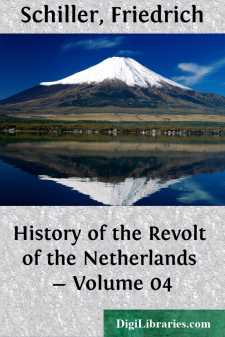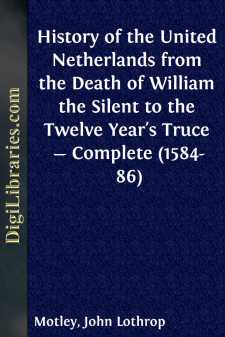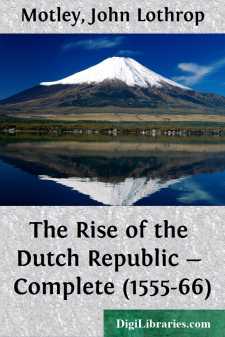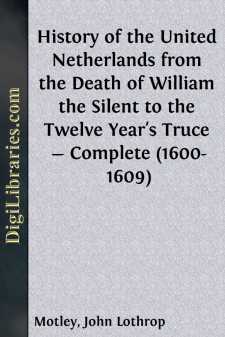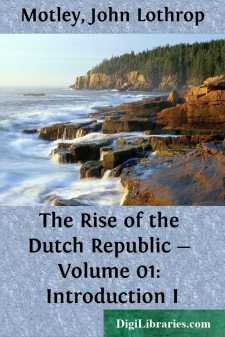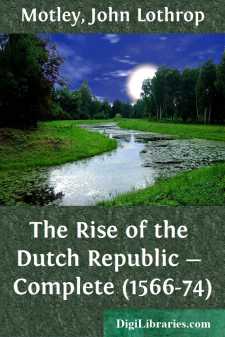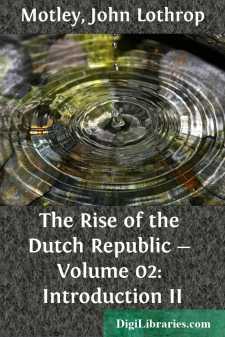History
- Africa 30
- Americas (North Central South West Indies) 50
- Ancient 68
- Asia 58
- Australia & New Zealand 8
- Canada 41
- Caribbean & West Indies 1
- Civilization 20
- Eastern Europe 12
- Europe 310
- Expeditions & Discoveries 60
- General 77
- Historical Geography 1
- Jewish 9
- Latin America 3
- Medieval 8
- Middle East 13
- Military 248
- Revolutionary 8
- Study & Teaching 5
- United States 353
- Western Europe 56
- World 13
History Books
Sort by:
Abdication of Charles resolved upon—Brussels in the sixteenth century—Hall of the palace described—Portraits of prominent individuals present at the ceremony—Formalities of the abdication— Universal emotion—Remarks upon the character and career of Charles —His retirement at Juste. On the twenty-fifth day of October, 1555, the estates of the Netherlands were assembled in the great hall of...
more...
The two counts were a few weeks after their arrest conveyed to Ghent under an escort of three thousand Spaniards, where they were confined in the citadel for more than eight months. Their trial commenced in due form before the council of twelve, and the solicitor-general, John Du Bois, conducted the proceedings. The indictment against Egmont consisted of ninety counts, and that against Horn of sixty....
more...
PREFACE. The indulgence with which the History of the Rise of the Dutch Republic was received has encouraged me to prosecute my task with renewed industry. A single word seems necessary to explain the somewhat increased proportions which the present work has assumed over the original design. The intimate connection which was formed between the Kingdom of England and the Republic of Holland, immediately...
more...
PREFACE The rise of the Dutch Republic must ever be regarded as one of the leading events of modern times. Without the birth of this great commonwealth, the various historical phenomena of: the sixteenth and following centuries must have either not existed; or have presented themselves under essential modifications.—Itself an organized protest against ecclesiastical tyranny and universal empire, the...
more...
Five great rivers hold the Netherland territory in their coils. Three are but slightly separated—the Yssel, Waal, and ancient Rhine, while the Scheldt and, Meuse are spread more widely asunder. Along each of these streams were various fortified cities, the possession of which, in those days, when modern fortification was in its infancy, implied the control of the surrounding country. The lower part...
more...
The effect produced in the republic by the defensive and uneventful campaigning of the year 1599 had naturally been depressing. There was murmuring at the vast amount of taxation, especially at the new imposition of one-half per cent. upon all property, and two-and-a-half per cent. on all sales, which seemed to produce so few results. The successful protection of the Isle of Bommel and the judicious...
more...
PREFACE The rise of the Dutch Republic must ever be regarded as one of the leading events of modern times. Without the birth of this great commonwealth, the various historical phenomena of: the sixteenth and following centuries must have either not existed; or have presented themselves under essential modifications.—Itself an organized protest against ecclesiastical tyranny and universal empire, the...
more...
Egmont in Flanders, Orange at Antwerp, Horn at Tournay; Hoogstraaten at Mechlin, were exerting themselves to suppress insurrection and to avert ruin. What, meanwhile, was the policy of the government? The secret course pursued both at Brussels and at Madrid may be condensed into the usual formula—dissimulation, procrastination, and again dissimulation. It is at this point necessary to take a rapid...
more...
Five centuries of isolation succeed. In the Netherlands, as throughout Europe, a thousand obscure and slender rills are slowly preparing the great stream of universal culture. Five dismal centuries of feudalism: during which period there is little talk of human right, little obedience to divine reason. Rights there are none, only forces; and, in brief, three great forces, gradually arising, developing...
more...
The dagger of Jacques Clement had done much, and was likely to do more, to change the face of Europe. Another proof was afforded that assassination had become a regular and recognised factor in the political problems of the sixteenth century. Another illustration was exhibited of the importance of the individual—even although that individual was in himself utterly despicable—to the working out of...
more...



